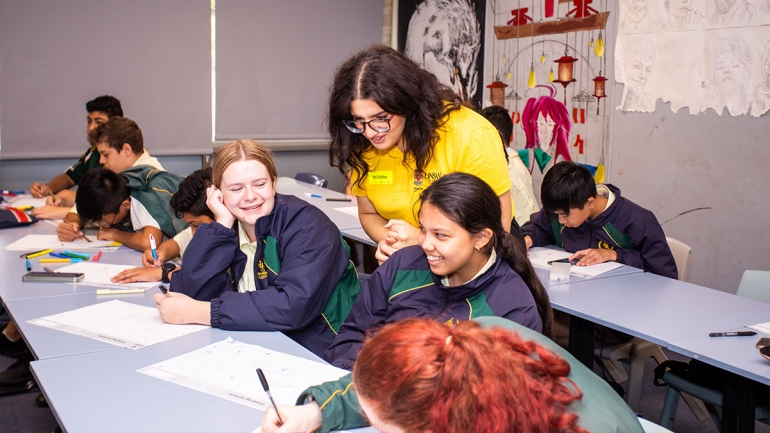UNSW, UTS and MQ are working with six schools in Western Sydney’s strict lockdown to deliver the Imagined Futures program which supports students in exploring their future selves and post-school options without limitations.
The NSW Equity Consortium is a five-year partnership led by UNSW Sydney with UTS and Macquarie University engaging in shared outreach work to build student and school capacities for accessing tertiary education and improving learning outcomes beyond school.
The alliance has developed the Imagined Futures program which uses literacy as a vehicle to encourage students to conceptualise their ‘imagined futures’ and positively impact their learning trajectory. The program targets whole cohort year-groups between Years 7 and 9 at selected Greater Western Sydney high schools where students are under-represented in higher education.
“At present – due to a range of funding and other pressures – typical outreach programs target only the senior secondary years. But research shows us that we need to be targeting these students much earlier,” said Sonal Singh, UTS Project Lead, Equity and Diversity Manager (Student Equity) at UTS Centre for Social Justice & Inclusion.
In collaboration with teachers, each partner university has begun delivering a component of the program to corresponding year groups at the following schools: Bass High School, Bonnyrigg High School, Cabramatta High School, Campbelltown Performing Arts High School, Prairiewood High School and Punchbowl Boys’ High School.
Due to the recent COVID-19 outbreak in NSW, forced school closures across Greater Western Sydney have shifted the program online.
“The work undertaken through the Consortium is now more crucial than ever,” said Mary Teague, the Project Lead, CI and UNSW Director of Access and Equity (Students).
“Many students in Greater Western Sydney who are caught in this lockdown already face educational disadvantage. We are making every effort to ensure that disruption to the program is minimised and have found ways to do things differently. Our objective is to continue to reach students and work closely with the teachers during this difficult time,” said Ms Teague.
The Imagined Futures program was originally designed to be delivered in-school with University Ambassadors – many of whom attended the partner Consortium high schools.
“University Ambassadors are key in the delivery of this program. They are representative of the high school cohort and have forged their path to university; in this way, the Ambassadors are a true depiction of students’ potential future selves,” said Ms Teague.
Macquarie University was due to deliver the Program’s Year 7 component when schools shut down. MQ’s Institutional Research Lead, Dr Janet Dutton, explains that they are supporting schools and teachers to ensure students engage in the learning experiences in ways that work best for them.
“We are currently working with Punchbowl Boys’ High School to create short videos of University Ambassadors which deliver some of the program’s learning activities and demonstrate firsthand how academic attainment can open a range of future possibilities,” said Dr Dutton.
The project facilitates a longitudinal research inquiry which will follow students over the first five years of their secondary schooling to explore their engagement in the program.
Dr Sally Baker from UNSW’s School of Education is leading the Research team for the project.
“This is a once-in-a-career opportunity that allows for the application of theoretical concepts in practice, while working to develop the best possible outcomes for students, teachers and universities by integrating a creative and collaborative research and evaluation strategy,” said Dr Baker.
The partnership recently received a $500,000 grant as part of the NSW Government’s Collaboration and Innovation Fund which supports university initiatives that address priority goals of the NSW Higher Education Strategy.
“The NSW Equity Consortium embodies a best practice approach to student equity through its partnerships, that has never been undertaken this way in Australia before.
“By bringing together school leadership, teachers, and universities, the partnership will leverage combined expertise to deliver a whole-of-cohort program that supports the development of high school students as self-reflective, life-long learners,” said Ms Teague.
